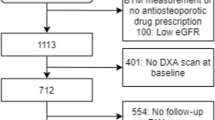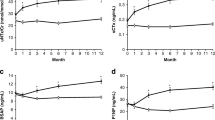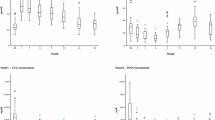Abstract
Introduction
Since the soluble receptor activator of the NF-κB ligand (sRANKL) as well as the endogenous anti-resorptive cytokine osteoprotegerin (OPG) are produced by osteoblasts and given that these cells undergo significant changes during antiresorptive treatment, we hypothesized that treatment with bisphosphonates (BP) would be accompanied by changes in serum OPG and sRANKL levels.
Methods
In a prospective, randomized controlled trial of previously untreated postmenopausal women with osteoporosis, oral BP therapy (daily doses of either 10 mg alendronate or 5 mg risedronate) in combination with calcium/vitamin D was compared to calcium/vitamin D treatment alone (control group). Follow-up at 2, 6 and 12 months was completed for 56 patients. Standardized spinal X-rays were performed at baseline, and DEXA measurements at the femoral neck and trochanter were made at baseline and after 1 year. Serum OPG and sRANKL levels were measured with a polyclonal antibody-based ELISA system.
Results
After 1 year, there was a non-significant loss in neck and trochanteric bone mineral density (BMD) in the CTR group and a mean increase of 3.3% and 4.6% in the combined BP group (both p<0.0001), respectively. Serum levels of C-terminal telopeptides of type I collagen (sCTX) and osteocalcin decreased by 12% and 10% at 12 months in the CTR group and by 43% and 23% in the combined BP group, respectively (all significant). OPG serum levels in the CTR group decreased significantly by 9% at 2 months (p<0.005) and remained below pre-treatment levels at later time points. Both the alendronate- and risedronate-treated patient groups showed unaltered OPG levels after 2 months, but they had significantly increased serum levels at 6 and 12 months. Levels of sRANKL were unchanged throughout the treatment period. Univariate regression analysis demonstrated that changes in serum OPG levels after 12 months of BP treatment were positively and better correlated to BMD changes (trochanter: r= 0.59, p<0.0001; neck: r= 0.50, p<0.001) than those of sCTX, which showed the expected negative correlation to BMD change (trochanter: r= –0.35, p=0.03; neck: r= –0.23, p=0.16). With multiple regression analyses at 12 months, R2 values for 1-year changes in trochanteric BMD of 0.33 (OPG alone) and 0.23 (sCTX alone) were significantly improved to the 0.57 when OPG and sCTX changes were combined (p<0.001). Results for the femoral neck were also statistically significant R2=0.35, p<0.001). BMD and OPG changes in the CTR group were not correlated with each other.
Conclusions
We conclude that with BP treatment, changes in serum OPG levels, unlike changes in sCTX levels, are positively correlated to changes in BMD response. The BP-related changes in serum OPG levels during treatment could result from effects on osteoclastogenesis and osteoclast apoptosis as well as from a direct stimulatory effect on osteoblastic OPG production. These changes in OPG levels may be used to predict the individual response of patients to BP treatment.





Similar content being viewed by others
References
Luckman SP, Hughes DE, Coxon FP, Graham R, Russell G, Rogers MJ (1998) Nitrogen-containing bisphosphonates inhibit the mevalonate pathway and prevent post-translational prenylation of GTP-binding proteins, including Ras. J Bone Miner Res 13:581–589
Mönkkönen H, Lehenkari PP, Kellinsalmi M (2004) A new mechanism of action for bisphosphonates: apppi dedicated cytotoxicity of N-BPs. Bone 34:S66–S67
Eriksen EF, Melsen F, Sod E, Barton I, Chines A (2002) Effects of long-term risedronate on bone quality and bone turnover in women with postmenopausal osteoporosis. Bone 31:620–625
Boivin GY, Chavassieux PM, Santora AC, Yates J, Meunier PJ (2000) Alendronate increases bone strength by increasing the mean degree of mineralization of bone tissue in osteoporotic women. Bone 27:687–694
Rodan GA, Martin TJ (1981) Role of osteoblasts in hormonal control of bone resorption- a hypothesis. Calcif Tissue Int 33:349–351
Sahni M, Guenther HL, Fleisch H, Collin P, Martin TJ (1993) Bisphosphonates act on rat bone resorption through the mediation of osteoblasts. J Clin Invest 91:2004–2011
Vitte C, Fleisch H, Guenther HL (1996) Bisphosphonates induce osteoblasts to secrete an inhibitor of osteoclast-mediated resorption. Endocrinology 137:2324–2333
Giuliani N, Pedrazzoni M, Passeri G, Girasole G (1998) Bisphosphonates inhibit IL-6 production by human osteoblast-like cells. Scand J Rheumatol 27:38–41
Olmos JM, De Vega T, Perera L, Riancho JA, Amado JA, Gonzalez Macias J (1999) Etidronate inhibits the production of IL-6 by osteoblast-like cells. Methods Find Exp Clin Pharmacol 21:519–522
Reinholz GG, Getz B, Pederson L, Sanders ES, Subramaniam M, Ingle JN, Spelsberg TC (2000) Bisphosphonates directly regulate cell proliferation, differentiation, and gene expression in human osteoblasts. Cancer Res 60:6001–6007
Plotkin LI, Weinstein RS, Parfitt AM, Roberson PF, Manolagas SC, Bellido T (1999) Prevention of osteocyte and osteoblast apoptosis by bisphosphonates and calcitonin. J Clin Invest 104:1363–1374
Gandolfi MG, Pugnaloni A, Mattioli-Belmonte M, Muzzarelli R, De Benedittis A, Mengucci P, Zucchini C, Tesei M, Caudarella R, Biag G (1999) Osteoblast behaviour in the presence of bisphosphonates: ultrastructural and biochemical in vitro studies. Clin Exp Rheumatol 17:327–333
Viereck V, Emons G, Lauck V, Frosch KH, Blaschke S, Gründker C, Hofbauer LC (2002) Bisphosphonates pamidronate and zoledronic acid stimulate osteoprotegerin production by primary human osteoblasts. Biochem Biophys Res Commun 291:680–686
Im GI, Qureshi SA, Kenney J, Rubash HE, Shanbhag AS (2004) Osteoblast proliferation and maturation by bisphosphonates. Biomaterials 25:4105–4115
Giuliani N, Pedrazzoni M, Negri G, Passeri G, Impicciatore M, Girasole G (1998) Bisphosphonates stimulate formation of osteoblast precursors and mineralized nodules in murine and human bone marrow cultures in vitro and promote early osteoblastogenesis in young and aged mice in vivo. Bone 22:455–461
Pan B, Farrugia AN, Bik To L, Findlay DM, Green J, Lynch K, Zannettino CW (2004) The nitrogen-containing bisphosphonate, zoledronic acid, influences RANKL expression in human osteoblast-like cells by activating TNF-α converting enzyme (TACE). J Bone Miner Res 19:147–154
Chen T, Berenson J, Vescio R, Swift R, Gilchick A, Goodin S, LoRusso P, Ma P, Ravera C, Deckert F, Schran H, Seaman J, Skerjanec A (2002) Pharmacokinetics and pharmacodynamics of zoledronic acid in cancer patients with bone metastases. J Clin Pharmacol 42:1228–1236
Mezquita-Raya P, de la Higuera M, Garcia DF, Alonso G, Ruiz-Requena ME, de Dios Luna J, Escobar-Jimenez F, Munoz-Torres M (2005) The contribution of serum osteoprotegerin to bone mass and vertebral fractures in postmenopausal women. Osteoporos Int. 16:1368–1374
Oh KW, Rhee EJ, Lee WY, Kim SW, Baek KH, Kang MI, Yun EJ, Park CY, Ihm SH, Choi MG, Yoo HJ, Park SW (2005) Circulating osteoprotegerin and receptor activator of NF-kappaB ligand system are associated with bone metabolism in middle-aged males. Clin Endocrinol 62:92–98
Indridason OS, Franzson L, Sigurdsson G (2005) Serum osteoprotegerin and its relationship with bone mineral density and markers of bone turnover. Osteoporos Int 16:417–423
Szulc P, Hofbauer LC, Heufelder AE, Roth S, Delmas PD (2001) Osteoprotegerin serum levels in men: correlation with age, estrogen, and testosterone status. J Clin Endocrinol Metab 86:3162–3165
Abdallah BM, Stilgren LS, Nissen N, Kassem M, Jorgensen HR, Abrahamsen B (2005) Increased RANKL/OPG mRNA ratio in iliac bone biopsies from women with hip fractures. Calcif Tissue Int 76:90–97
Fahrleitner-Pammer A, Dobnig H, Piswanger-Soelkner C, Bonelli C, Dimai HP, Leb G, Obermayer-Pietsch B (2003) Osteoprotegerin serum levels in women: correlation with age, bone mass, bone turnover and fracture status. Wien Klin Wochenschr 115:291–297
Browner WS, Lui LY, Cummings SR (2001) Associations of serum osteoprotegerin levels with diabetes, stroke, bone density, fractures, and mortality in elderly women. J Clin Endocrinol Metab 86:631–637
Ziolkowska M, Kurowska M, Radzikowska A, Luszczykiewicz G, Wiland P, Dziewczopolski W, Filipowicz-Sosnowska A, Pazdur J, Szechinski J, Kowalczewski J, Rell-Bakalarska M, Maslinski W (2002) High levels of osteoprotegerin and soluble receptor activator of nuclear factor kappa B ligand in serum of rheumatoid arthritis patients and their normalization after anti-tumor necrosis factor alpha treatment. Arthritis Rheum 46:1744–1753
Amato G, Mazziotti G, Sorvillo F, Piscopo M, Lalli E, Biondi B, Iorio S, Molinari A, Giustina A, Carella C (2004) High serum osteoprotegerin levels in patients with hyperthyroidism: effect of medical treatment. Bone 35:785–791
Stilgren LS, Rettmer E, Eriksen EF, Hegedus L, Beck-Nielsen H, Abrahamsen B (2004) Skeletal changes in osteoprotegerin and receptor activator of nuclear factor-kappa β ligand mRNA levels in primary hyperparathyroidism: effect of parathyroidectomy and association with bone metabolism. Bone 35:256–265
Moschen AR, Kaser A, Enrich B, Ludwiczek O, Gabriel M, Obrist P, Wolf AM, Tilg H (2005) The RANKL/OPG system is activated in inflammatory bowel disease and relates to the state of bone loss. Gut 54:479–487
Sankaralingam S, Frost M, Fogelman I, Hampson G (2003) Early changes in serum osteoprotegerin (OPG) correlates with changes in bone mineral density following treatment with risedronate in post-menopausal women with osteoporosis (Abstract). J Bone Miner Res 18:S158
Kanis JA, Melton LJ, Christiansen C, Johnston CC, Khaltaev N (1994) The diagnosis of osteoporosis. J Bone Miner Res 9:1137–1141
Genant HK, Wu CY, Van Kulik C, Nevitt MC (1993) Vertebral fracture assessment using a semiquantitative technique. J Bone Miner Res 8:1137–1148
Ravn P, Hosking D, Thompson D, Cizza G, Wasnich RD, McClung M, Yates AJ, Bjarnason NH, Christiansen C (1999) Monitoring of alendronate treatment and prediction of effect on bone mass by biochemical markers in the early postmenopausal intervention study. J Clin Endocrinol Metab 84:2363–2368
Christgau S, Rosenquist C, Alexandersen P, Hannover Bjarnason N, Ravn P, Fledelius C, Herling C, Qvist P, Christiansen C (1998) Clinical evaluation of the serum crosslaps one step ELISA, a new assay measuring the serum concentration of bone-derived degradation products of type I collagen C-telopeptides. Clin Chem 44:2290–2300
Greenspan SL, Parker RA, Ferguson L, Rosen HN, Maitland-Ramsey L, Karpf DB (1998) Early changes in biochemical markers of bone turnover predict the long-term response to alendronate therapy in representative elderly women: a randomized clinical trial. J Bone Miner Res 13:1431–1438
Rogers A, Hannon RA, Eastell R (2000) Biochemical markers as predictors of rates of bone loss after menopause J Bone Miner Res 15:1398–1404
Hofbauer LC, Kuhne CA, Viereck V (2004) The OPG/RANKL/RANK system in metabolic bone diseases. J Musculoskelet Neuronal Interact 4:268–275
Hughes DE, Wright KR, Uy HL, Sasaki A, Yoneda T, Roodman GD, Mundy GR, Boyce BF (1995) Bisphosphonates promote apoptosis in murine osteoclasts in vitro and in vivo. J Bone Miner Res 10:1478–1487
Chavassieux PM, Arlot ME, Reda C, Wie L, Yates AJ, Meunier PJ (1997) Histomorphometric assessment of the long-term effects of alendronate on bone quality and remodeling in patients with osteoporosis. J Clin Invest 100:1475–1480
Bone HG, Downs RW, Tucci JR, Harris ST, Weinstein RS, Licata AA, McClung MR, Kimmel DB, Gertz BJ, Hale E Polvino WJ (1997) Dose-response relationships for alendronate treatment in osteoporotic elderly women. J Clin Endocrinol Metab 82:265–274
Gori F, Hofbauer LC, Dunstan CR, Spelsberg TC, Khosla S, Riggs BL (2000) The expression of osteoprotegerin and RANK ligand and the support of osteoclast formation by stromal-osteoblast lineage cells is developmentally regulated. Endocrinology 141:4768–4776
Lips P (2001) Vitamin D deficiency and secondary hyperparathyroidism in the elderly: consequences for bone loss and fractures and therapeutic implications. Endocr Rev 22:477–501
Vasikaran SD (2001) Bisphosphonates: an overview with special reference to alendronate. Ann Clin Biochem 38:608–623
Greenspan SL, Holland S, Maitland-Ramsey L, Poku M, Freeman A, Yuan W, Kher U, Gertz B (1996) Alendronate stimulation of nocturnal parathyroid hormone secretion: a mechanism to explain the continued improvement in bone mineral density accompanying alendronate therapy. Proc Assoc Am Physicians 108:230–238
Black DM, Cummings SR, Karpf DB, Cauley JA, Thompson DE, Nevitt MC, Bauer DC, Genant HK, Haskell WL, Marcus R, Ott SM, Torner JC, Quandt SA, Reiss TF, Ensrud KE (1996) Randomised trial of effect of alendronate on risk of fracture in women with existing vertebral fractures. Fracture Intervention Trial Research Group. Lancet 348:1535–1541
Acknowledgements
The authors should like to thank Eugenia Lamont for reading the manuscript.
Author information
Authors and Affiliations
Corresponding author
Rights and permissions
About this article
Cite this article
Dobnig, H., Hofbauer, L.C., Viereck, V. et al. Changes in the RANK ligand/osteoprotegerin system are correlated to changes in bone mineral density in bisphosphonate-treated osteoporotic patients. Osteoporos Int 17, 693–703 (2006). https://doi.org/10.1007/s00198-005-0035-4
Received:
Accepted:
Published:
Issue Date:
DOI: https://doi.org/10.1007/s00198-005-0035-4




